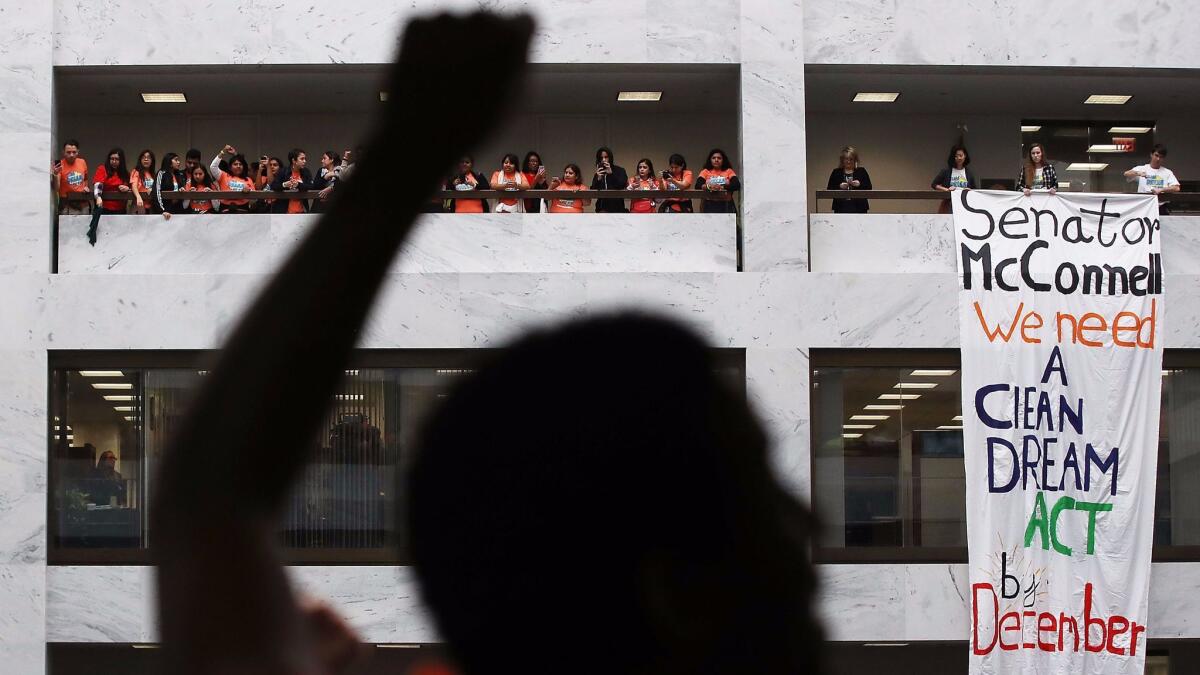DACA negotiations slow as Trump demands more than Democrats will give

- Share via
Reporting from Washington — Bipartisan negotiations over protecting so-called Dreamers from deportation have stalled over demands from President Trump and Republican lawmakers that any new law also include tougher measures on legal and illegal immigration.
The legislative impasse persists more than two months after Trump ordered a gradual end to an Obama administration program known as DACA, for Deferred Action for Childhood Arrivals, to give Congress time to act on an alternative. Failure to reach agreement by December could jeopardize action on a separate government-funding bill, threatening a shutdown.
Under Trump’s DACA order in September, starting on March 6 nearly 700,000 people brought to the country illegally as children will become eligible for deportation as their work permits and deportation deferrals begin expiring on a rolling basis.
Trump, at the time of his order, called on Congress to devise a law providing some protections — a reflection of the popularity of Dreamers, most of whom have hardly known any home but the United States, and now work, serve in the military or go to college. Later, however, he outlined conditions, which Democratic leaders criticized as violating their tentative agreement with him.
Democrats have threatened to block a must-pass bill to fund the government by Dec. 8, when the current government-spending law expires, if it doesn’t include provisions to create a path to legal status for Dreamers. Republicans want to keep the budget and immigration proposals separate. The two sides aren’t close to an agreement, according to three people involved in the negotiations.
House Speaker Paul D. Ryan, a Wisconsin Republican, said flatly Tuesday on Fox News that DACA would not be part of the December funding bill. Yet he expressed optimism on CNBC on Wednesday: “We know we are going to do a DACA fix. It’s going to have to have a lot of other things to it” for border enforcement.
The top Democrats in Congress, Rep. Nancy Pelosi of San Francisco and Sen. Chuck Schumer of New York, thought they had made a preliminary deal with Trump during an Oval Office meeting in September, at the time of his DACA order. As they described it, and Trump initially seemed to agree, the deal ultimately would extend work permits and protections from deportation for those already in the DACA program in exchange for more border security funding.
A few weeks later, Trump started specifying more conditions.
First he wrote on Twitter that any bill would have to curb the ability of recent American citizens to sponsor family members to join them as legal immigrants, what Trump has repeatedly referred to as “chain migration.”
In October, the White House released a lengthy list of immigration limits to be included in any immigration bill that reaches Trump’s desk. Among them: a reduction in legal immigration visas, penalties for cities and localities that don’t cooperate fully with federal immigration authorities, and a mandate that employers use the government’s E-Verify system to ensure that workers they hire are legal residents.
“If we’re gonna do something, we have to get something in return,” he said in a Fox interview with Sean Hannity last week. “And what I want is tremendous border regulation, I want the wall, and we’re gonna get other things, and we’re gonna see if we can work something out.”
Many of the initiatives are non-starters for Democrats, who saw the new demands as reflecting the influence of nativists on Trump’s White House staff.
Talks have sputtered since then, with no sign of a path forward. On Oct. 5 the government ceased granting work permits and deportation deferrals, or renewing old ones, which means hundreds of young immigrants could start losing their jobs every week as their two-year work permits expire in March.
Lawmakers of both parties who represent large populations of immigrant families are already hearing concerns from constituents about how the rolling shutdown of DACA will affect their lives and businesses.
Waiting until March to pass a legislative fix would be too late, said Rep. Mario Diaz-Balart, a Florida Republican who has worked closely with House Democrats in the past on failed efforts to hammer out immigration deals.
“These are folks that have jobs, that are going to school, that have mortgages,” he said Thursday. “As far as urgency, that’s number one.”
Several Republican lawmakers have met with Democrats over the past several weeks to see where there might be room to make a deal, Diaz-Balart said.
“There are a lot of positive conversations taking place,” he said. “Are we there? No. Can we get there? We have to.”
On the Senate side, Majority Leader Mitch McConnell, a Republican from Kentucky, has asked for a solution from a small group of Republican senators that includes the chairman of the Senate Judiciary Committee, Sen. Chuck Grassley of Iowa, and Sens. John Cornyn of Texas, Thom Tillis of North Carolina and Lindsey Graham of South Carolina.
Graham co-sponsored the Dream Act, a bipartisan bill that would create a path to legal status for Dreamers. Democrats essentially want Trump to accept that legislation.
The main negotiators among Democrats in the Senate are Schumer and Minority Whip Dick Durbin of Illinois, who has worked closely with Graham on ways to protect Dreamers in the past.
Twitter: @ByBrianBennett
More to Read
Get the L.A. Times Politics newsletter
Deeply reported insights into legislation, politics and policy from Sacramento, Washington and beyond. In your inbox twice per week.
You may occasionally receive promotional content from the Los Angeles Times.











